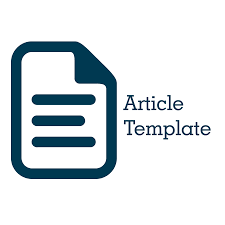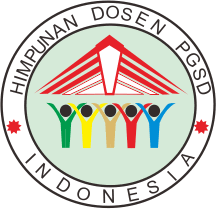Analisis kelayakan isi buku siswa kelas v tema ekosistem di sekolah dasar
Abstract
This study aims to describe the acceptability of the contents of the Grade V Student Book by the Ecosystem Theme. This research used descriptive qualitative research methods. The research approach is contents analysis. As a data collection technique, the writer used documentation technique. As data analysis, the writer used descriptive qualitative technique. As a data validity technique, the writer used investigator triangulation technique. In this study, there are four dimensions were analyzed which are the spiritual dimension, the dimension of social attitudes, the dimension of knowledge, and the dimension of skills. The results showed that the grade V Student Book by the Ecosystem Theme is included in the very acceptable category with the percentage of the acceptability score in the spiritual dimension is 65.28%, the acceptability of the social attitude dimension is 100%, the acceptability of the knowledge dimension is 93.52%, and the acceptability of the the skill dimension is 86.11%. This study has theoretical implications, namely that book can support the implementation of curriculum learning 2013 in schools. The study also has pratical implications, this study can be used as a reference material for teachers and schools to choosing books that suit the needs of students.
Keywords
Full Text:
PDFReferences
H. Wijaya, N. Sulistya, and W. Tego 2018 Peningkatan Motivasi Belajar Tematik Melalui Model Pembelajaran Group Investigation Siswa Kelas 4 SD J. Didakt. Dwija Indria 6(7) pp 69–84 [2] B. P. Sitepu 2012 Penulisan Buku Teks Pelajaran (Bandung: PT Remaja Rosdakarya) [3] G. S. Pratama and H. Retnawati 2018 Urgency of Higher Order Thinking Skills (HOTS) Content Analysis in Mathematics Textbook J. Phys. Conf. Ser. 1097(1) [4] A. Primanda, N. Maharta, and F. Sesunan 2015 Pengembangan Suplemen Buku Siswa Materi Dinamika Gerak Dengan Pendekatan Scientific J. Pembelajaran Fis. Univ. Lampung 3(3) p 117552 [5] T. A. Prasetyo, N. Maharta, and V. Viyanti 2014 Pengembangan Buku Siswa Dengan Pendekatan Scientific Berbasis Multirepresentasi Materi Impuls dan Momentum J. Pembelajaran Fis. 2(4) pp 67–78 [6] W. Wahyudi and M. Chamdani 2017 Impementasi Kurikulum 2013 Di Sekolah Dasar Masalah Dan Solusinya (Studi Kasus Di Kabupaten Kebumen) DWIJA CENDEKIA J. Ris. Pedagog. 1(1) pp 92–108 [7] R. Ruminiati and K. Andajani 2016 Analisis Kesesuaian Isi Buku Tematik Kelas Iv Sekolah Dasar Dengan Pendidikan Karakter, Dan Pendekatan Scientific Sekol. Dasar Kaji. Teor. dan Prakt. Pendidik. 25(1) pp 27–36 [8] N. Novitasari, C. Nabila, and W. H. Fratiwi 2020 Analisis Kendala Guru dalam Menerapkan K13 Terhadap Hasil Belajar Siswa di SDN Pegadungan 8 Petang J. Bintang 2 pp. 1–15 [9] H. Salehi and M. Amini 2016 Critical Analysis of a New English Textbook Used in Iranian Junior High Schools J. Appl. Linguist. Lang. Res. 3(3) pp 42–54 [10] M. Muslich 2010 Text Book Writing (Yogyakarta: AR-Ruzz Media) [11] BSNP 2014 Instrumen Penilaian Buku Teks Pelajaran Tahun 2014 Badan Standar Nasional Pendidikan [Online] Available: https://bsnp-indonesia.org/2014/05/instrumen-penilaian-buku-teks-pelajaran-tahun-2014/. [12] Sugiyono 2016 Metode Penelitian Kuantitatif, Kualitatif, dan R&D (Bandung: Penerbit Alfabeta) [13] S. Arikunto 2010 Prosedur Penelitian Suatu Pendekatan Praktik (Yogyakarta: Rineka Cipta) [14] K. Krippendorff 2010 Content Analysis: An Introduction to Its Methodology 2nd ed. (New York: Sage Publication) [15] S. Arikunto 2006 Prosedur Penelitian (Jakarta: Rineka Cipta) [16] Mislia 2018 Kelayakan Buku Teks Bahasa Indonesia Kelas VIII DI MTS Kabupaten Malang (Sebuah Kajian Berdasarkan Standar BSNP) Undergraduate Thesis Universitas Muhammadiyah Malang [17] L. J. Moleong 2012 Metodologi Penelitian Kualitatif (Bandung: PT Remaja Rosda Karya) [18] Q. M. Nisa 2015 Analisis Kelayakan Isi Buku Teks Siswa Kelas IV SD/MI Tema Peduli Terhadap Makhluk Hidup Kurikulum 2013 Terbitan Kementrian Pendidikan Dan Kebudayaan Undergraduate Thesis Universitas Islam Negeri Walisongo [19] L. Hakim 2017 Analisis Perbedaan Antara Kurikulum KTSP dan Kurikulum 2013,” J. Ilm. Didakt. 17(2) pp 280–292 [20] Isnani, R. Masykur, and S. Andriani 2021 Penerapan Konsep Kurikulum Integrated Melalui Pembelajaran Connected Mathematics Project (CMP) Terhadap Kemampuan Komunikasi Matematis J. THEOREMS The Orig. Res. Math. 5(2) pp 167–177 [21] Kemendikbud 2014 Kurikulum 2013 Sekolah Dasar/Madrasah Ibtidaiyah Kementerian Pendidikan dan Kebudayaan [Online]. Available: https://jdih.kemdikbud.go.id/?service=srv:04.15jdih&ref=16ey5e0r71029925u00cc571a518cb5b0wvb64412051eepe4d4e1ajfhac3625dd99d8a362l64c0ge6a7e94k28ccb65be953t30d552mqi84b7x0ddoff5fzsbb323281&task=100. [22] D. A. Fauzia, S. Marmoah, and Suharno 2020 Peningkatan Keaktifan Belajar dalam Pembelajaran IPS melalui Penerapan Model Pembelajaran Guided Note Taking pada Peserta didik Kelas IV Sekolah Dasar Ngadipurwo Blora J. Pendidik. Dasar 8(2) [23] H. Muamanah 2020 Pelaksanaan Teori Belajar Bermakna David Ausubel Dalam Pembelajaran Pendidikan Agama Islam Balajea J. Pendidik. Islam 5(01) pp 23–36 [24] Solekhah, J. I. S. Poerwanti, and S. Wahyuningsih 2020 Meningkatkan Keterampilan Berpikir Kritis Pada Mata Pelajaran IPS Siswa Kelas IV Sekolah Dasar J. Pendidik. Indones. J. Ilm. Pendidik. 6(3) [25] I. Kharisma 2018 Implementation of an environmental-based alternative integrative thematic model to increase meaningfulness and learning outcome J. Pendidik. dan Pengajaran 51(3) pp 154–162 [26] D. Sugianto, Kartono, and M. I. Sriyanto 2016 Penerapan Model Pembelajaran Discovery Learning untuk Meningkatkan Keterampilan Eksperimen J. Didakt. Dwija Indria 4(5) [27] Baharuddin and E. N. Wahyuni 2015 Teori Belajar & Pembelajaran (Yogyakarta: AR-RUZZ MEDIA) [28] S. R. Croy 2018 Development of a Group Work Assessment Pedagogy Using Constructive Alignment Theory Nurse Educ. Today 61 pp 49–53 [29] N. Sugrah 2019 Implementasi Teori Belajar Konstruktivisme dalam Pembelajaran Sains HUMANIKA, Kaji. Ilm. Mata Kuliah Umum 19(2) pp 121–138 [30] Supriadi 2015 Pemanfatan Sumber Belajar dalam Proses Pembelajaran Lantanida J. 3(2) pp 127–139 [31] L. Fan, Y. Zhu, and Z. Miao 2013 Textbook research in mathematics education: Development status and directions ZDM - Int. J. Math. Educ. 45(5) pp 633–646
Refbacks
- There are currently no refbacks.



